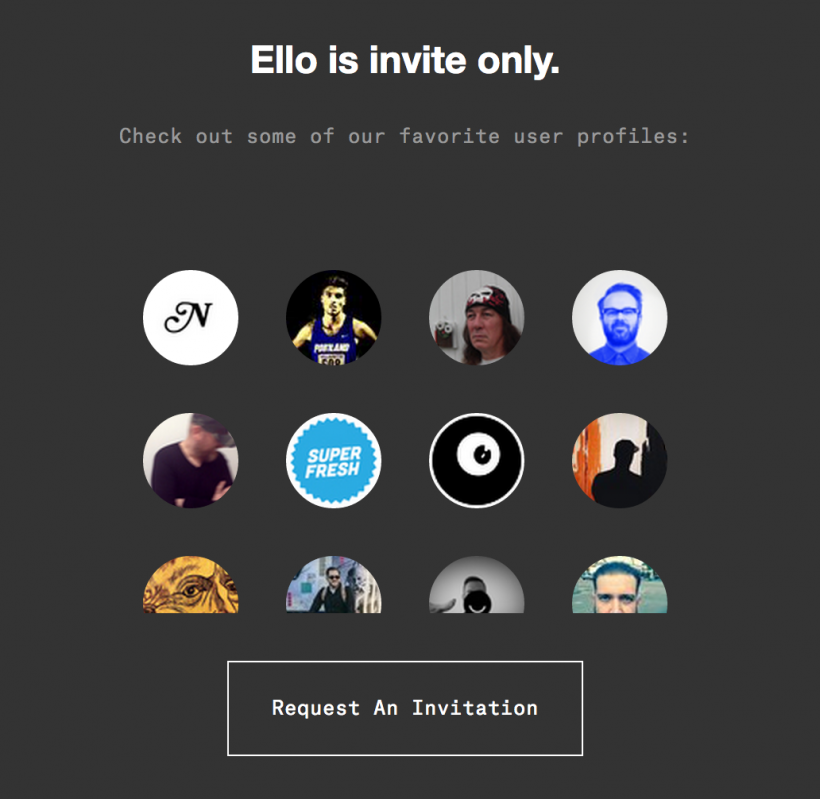
Credit: Ello
If your online experience has been anything like mine of late, you’ve been flooded with mentions of “Ello.” It’s on Twitter, Facebook, in the news. Like a fruit fly, it kept buzzing around my life on the Interwebs, until I finally realized it wasn't going to buzz off, and I broke. Fine, I'll bite. I dove into an investigation.
Here are the basics: Ello is a new social network. This is probably what you know. More specifically, it’s a social network that has no ads. But don’t call it the “anti-Facebook” as, according to its CEO Paul Budnitz, that gives Facebook a bit too much credit:
“We don’t consider Facebook to be a competitor. We consider them to be an advertising platform more than a social network.”
In fact, Ello has an entire manifesto devoted to this very matter.
The manifesto starts:
"Your social network is owned by advertisers.
Every post you share, every friend you make, and every link you follow is tracked, recorded, and converted into data. Advertisers buy your data so they can show you more ads. You are the product that’s bought and sold."
And concludes with: “You are not a product.”
To sign up for the network, you in fact have to accept this manifesto. For those that don’t? They are feistily shot over to Facebook. Burn.
Though I find Ello’s haughtiness off-putting (you literally have to be invited to join, though you can request an invitation—cue needless, self-important exclusivity), Facebook is in fact an ad-selling machine that’s only building steam. It announced on Sunday that it will start selling marketers ads that will appear all over the web—not just on the social network.
By contrast, Ello claims it will never have ads. Apparently it will derive profits from additional apps people can choose to purchase. It also touts a "beautiful, simple" design which I was all like [insert rude hand gesture here] about until I read an analogy of Ello’s design to my home state. I’ll be honest that my thoughts on Ello, for a minute at least, grew positive upon discovering that it is based in Burlington, Vermont.
In an interview with Businessweek, CEO Budnitz spoke about Ello's Vermonter influence:
"I live in Vermont. This is a state where billboards are illegal. When you go over the border into New York you suddenly say, ‘What’s different here? It feels so weird.’ And you realize there are Egg McMuffin ads everywhere. It’s one of the reasons why Vermont is so beautiful."
Anyone who promotes Vermont's beauty and its unique billboard-free-ness gets at least 20 points in my book. But once I checked back in from the glee of seeing my home state being discussed in a conversation not about skiing or maple syrup, my pro-Ello feelings began to wane.
Although the site’s membership has absolutely skyrocketed last week—seeing 50,000 users signing up every hour, “from all over the world”—it lacks, completely, any privacy settings. Further, it seems near impossible to search for friends unless you know their user name for the site. And there just didn’t seem to be enough unique features that made it interesting or valuable enough on its own to take time and effort out of one’s respective Insta/Twitter/Facebook games.
Conceded, the site is still in its beta phase and will be undergoing a lot of changes but . . . I’m not seeing among its listed future features what makes it different or interesting enough to be sustainable (sadly I must concede that its Vermonter ethos can only be extremely exciting to a sparse number of people—we are only a state of 600,000 people). Not to mention, companies like Netflix have already signed up for an account, which strikes me as odd given its purported Fort-Knox-like anti-advertising/corporate stance.
Plus, it still grosses me out that you need an invitation to join. I really don’t have time for that kind of needless elitism on my social networks.
So what's been driving up the site’s popularity? Likely a mix of FOMO (OMG-a-new-social-network-what-if-it-takes-off-i-gotta-get-it-now) and people who are genuinely upset about some of Facebook’s policies. The rampant selling of user data to advertisers, and requirement that users use their real names, have caused quite a PR maelstrom for Facebook, and rightly so. In the Bay Area, for instance, drag queens who have been forced to use their real names have cited this as dangerous and discriminatory, and threatened to mobilize against these policies.
But still, this all feels like a flash-in-the-pan social network phenomenon. Maybe I have it wrong and Ello will in fact take off and become huge. But for me that's still a win; everywhere should be lucky enough to be a bit more Vermont-infused.





